China urges US to respect history
By Li Xiaokun and Zhao Yinan in Beijing and Chen Weihua in Washington ( China Daily ) Updated: 2014-02-15 00:47:43Nobody can shake China's resolve in safeguarding sovereignty, Kerry told
Beijing on Friday urged Washington to respect historical facts and not take sides on territorial disputes in the East China Sea and South China Sea, as US Secretary of State John Kerry met Chinese leaders.
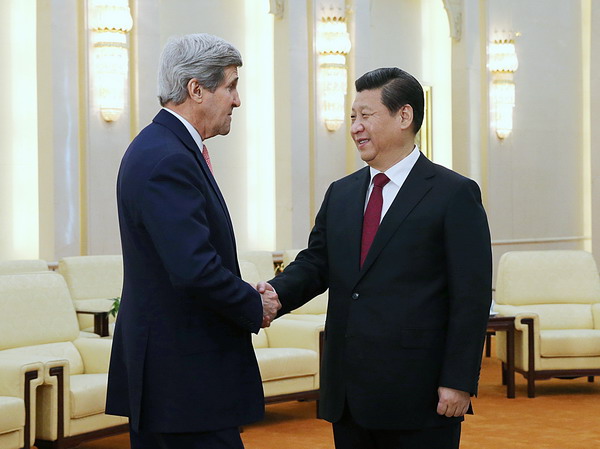 |
|
Chinese President Xi Jinping (R) shakes hands with US Secretary of State John Kerry during a meeting in Beijing on Friday. [Xu Jingxing/Asianewsphoto] |
Foreign Minister Wang Yi told Kerry that Beijing is committed to peacefully settling the disputes through consultations.
"However, nobody can shake our determination in safeguarding national sovereignty and territorial integrity," Wang said.
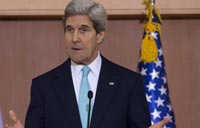 |
| Kerry's visit bodes well for China-US ties |
President Xi Jinping, Premier Li Keqiang and State Councilor Yang Jiechi also met Kerry on Friday.
Li noted that next year marks the 70th anniversary of victory in the world anti-fascist war. "We can prevent a repeat of the war only by facing and learning from history," Li said.
Kerry assured the Chinese officials and leaders that the US does not intend to contain China, and that China matters greatly to the US.
The remarks came a day after Kerry said on Thursday in Seoul, the first leg of his Asia trip, that China's Diaoyu Islands fall under the security treaty that obliges the US to intervene on Japan's behalf if it is attacked by a third country.
"That is the position of the United States with respect to those islands," he said, referring to them by their Japanese name.
Kerry is on his fifth trip to Asia since taking office last year. The Feb 13 to 18 tour will also take him to Indonesia and the United Arab Emirates.
Japan's relations with China and South Korea deteriorated further in December when Japanese Prime Minister Shinzo Abe visited the Yasukuni Shrine, which honors Japanese war dead, including 14 Class-A war criminals.
But Kerry said on Thursday that while there is "legitimate concern about the past", there are also "issues of enormous current pressing concern that deal with security that are relevant in terms of today, not in terms of history.
"And it is vital for us to be able to continue to stay focused on the high stakes, in terms of everybody's lives right now," he said.
Such remarks have irritated the media and public in South Korea, another ally of the US.
South Korea's Yonhap News Agency said in a commentary on Friday that Kerry put the two issues of security and history in the wrong order.
Hong Moon-jong, secretary-general of South Korea's ruling Saenuri Party, criticized Kerry for his lack of understanding of history.
"It would be inappropriate to treat the perpetrators on the same footing as victims," Hong said.
Xinhua News Agency said in a commentary on Friday, "To ease flaring regional tensions, what Washington is expected to do right at the moment is not to blame China but ask Japan to call off its provocative moves."
Douglas Paal, vice-president for studies at the Carne-gie Endowment for International Peace, said, "Abe is trending toward taking a view of history significantly at odds with the American view, and that should be voiced."
Sun Zhe, director of the Center for US-China Relations at Tsinghua University, said Washington has showed its support for Tokyo through its deeds.
For example, the US may have criticized Abe's visit to the Yasukuni Shrine, but only once. In addition, the US government has referred to China's Diaoyu Islands by their Japanese name.
However, Sun said Kerry's arrival showed the great importance Washington attaches to its relations with Beijing.
Jia Xiudong, a senior researcher on international affairs at the China Institute of International Studies, said that despite Beijing's dissatisfaction with the way Washington is handling China-Japan issues, Kerry is actually in China to prepare for frequent bilateral high-level meetings this year.
"But the US should show its sincerity and take concrete steps to establish a new type of relationship between major powers," Jia said.
Kerry also exchanged views with Chinese officials on Friday on the denuclearization of the Korean Peninsula.
"We will never allow any chaos or war on the peninsula," Wang Yi told Kerry.
Zhang Fan in Beijing contributed to this story.
Contact the writers at lixiaokun@chinadaily.com.cn and zhaoyinan@chinadaily.com.cn
|
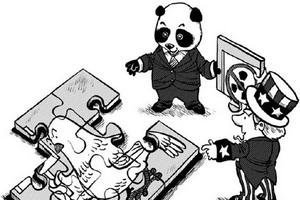 |
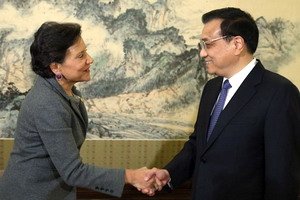 |
| Kerry's visit bodes well for China-US ties | China-US trade and investment links |
|
|
|
|
|
|
|
|
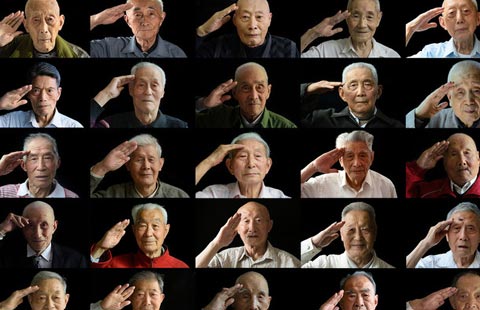
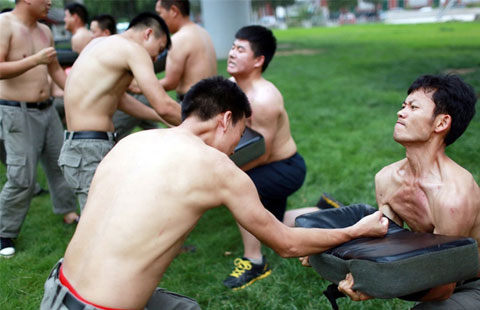

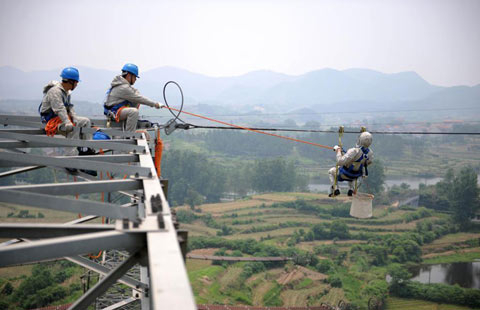




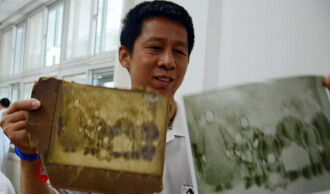









 Op Rana
Op Rana Berlin Fang
Berlin Fang Zhu Yuan
Zhu Yuan Huang Xiangyang
Huang Xiangyang Chen Weihua
Chen Weihua Liu Shinan
Liu Shinan